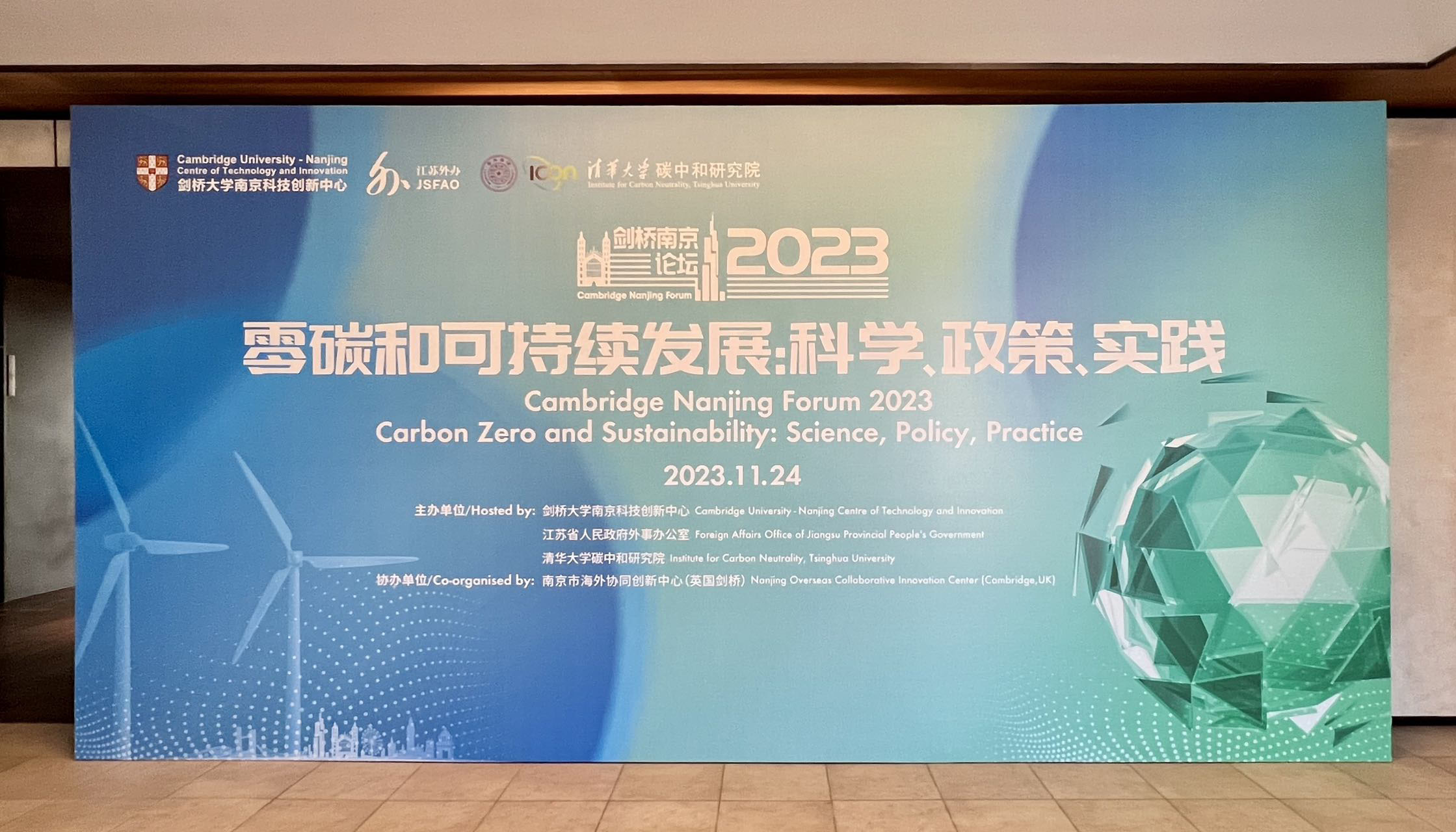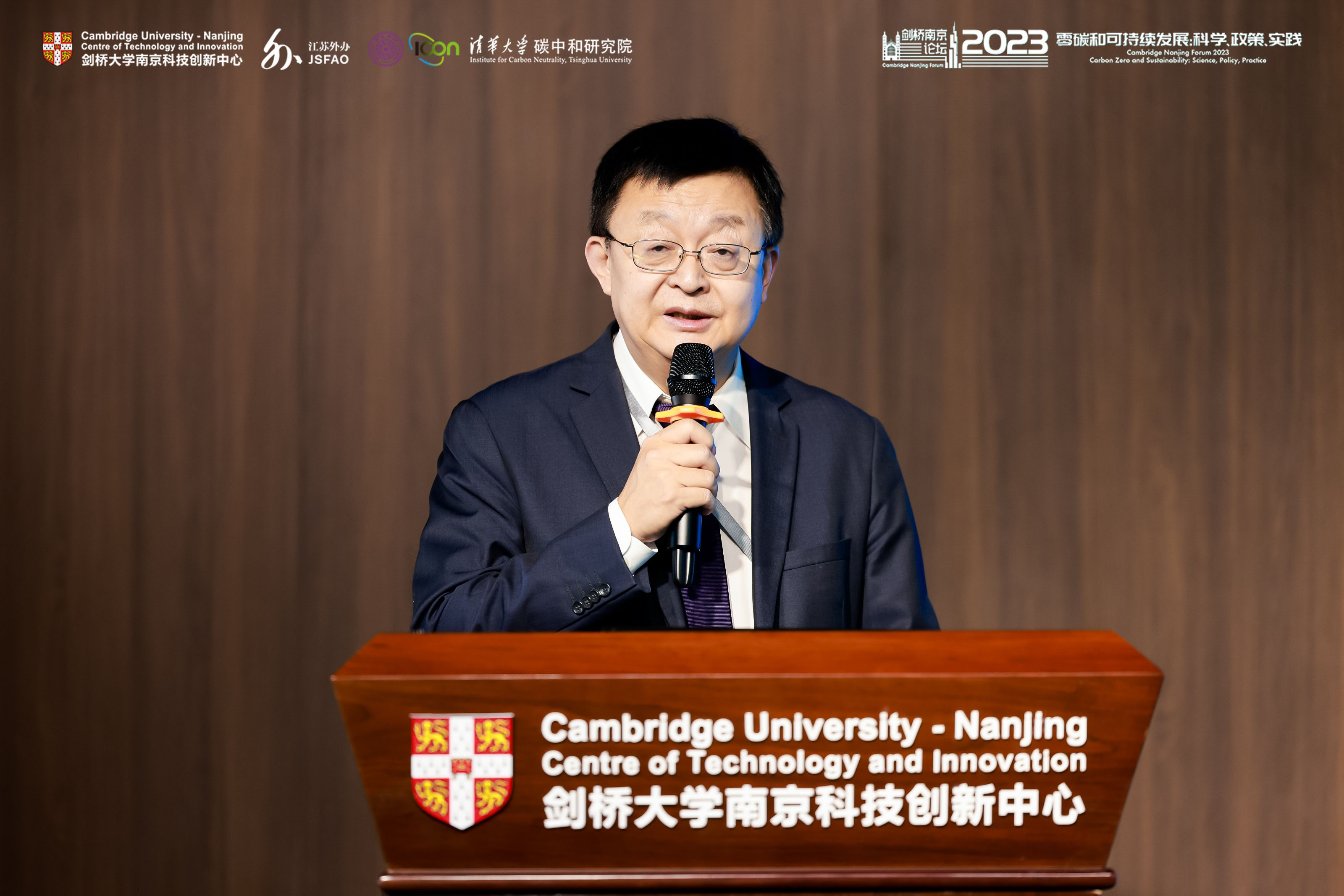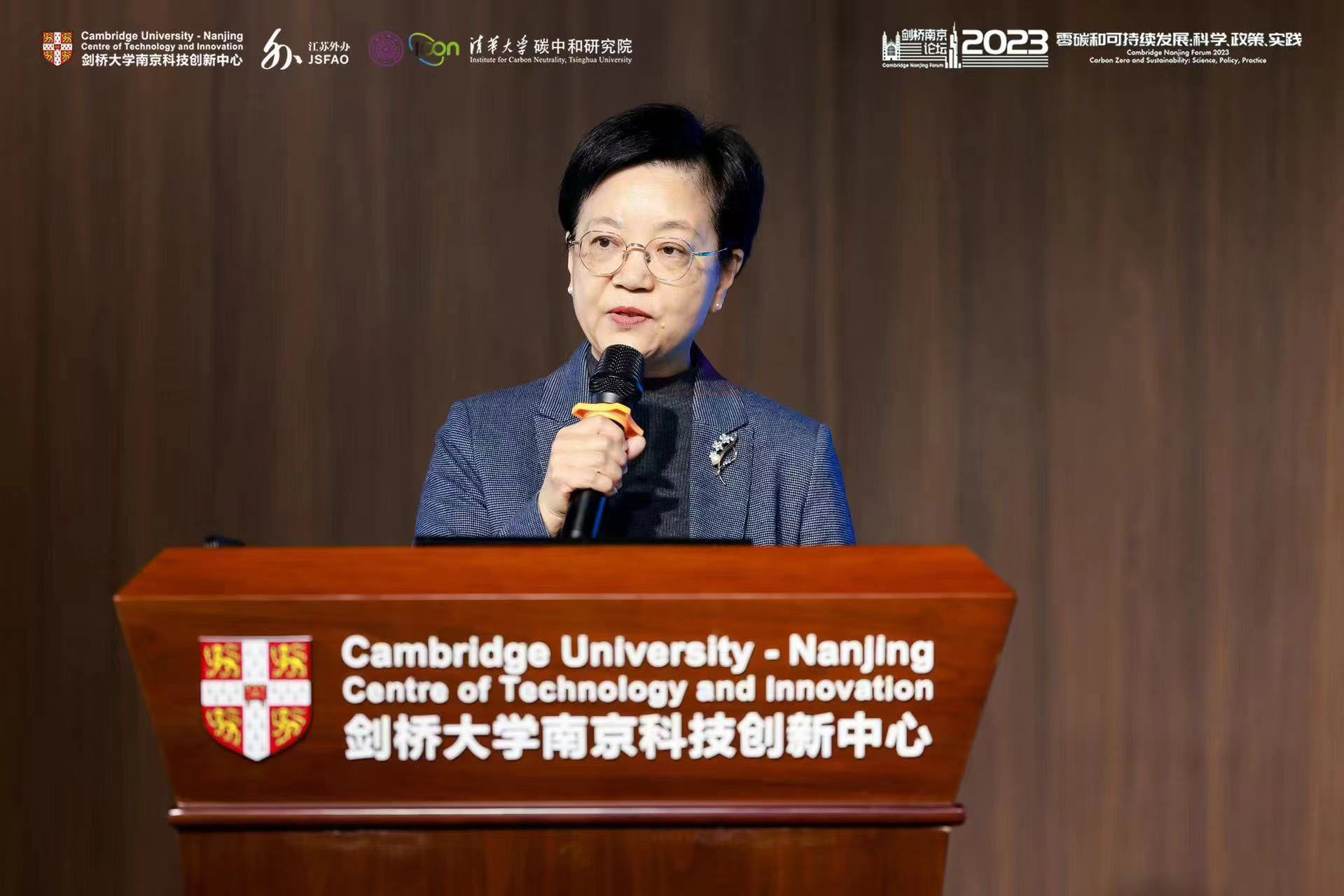Cambridge Nanjing Forum 2023- Carbon Zero and Sustainability: Science, Policy, Practice
Zero-carbon strategy represents a systemic transformation poised to reshape the global development paradigm. To attain the goal of zero carbon, unwavering support for science and technology innovation, policy coordination and leadership, and the green transformation of industries are imperative. On 24 November, the "Cambridge Nanjing Forum 2023 - Carbon Zero and Sustainability: Science, Policy, Practice", was successfully held in Nanjing.
The Forum is jointly hosted by the Cambridge University - Nanjing Centre of Technology and Innovation ("CUNJC"), the Foreign Affairs Office of Jiangsu Provincial People's Government, and the Institute for Carbon Neutrality of Tsinghua University, and co-organised by the Nanjing Overseas Collaborative Innovation Centre (Cambridge, UK). Experts and scholars from the University of Cambridge, Chinese Academy of Sciences, Tsinghua University, Zhejiang University, Nanjing University, Southeast University, and other leading Chinese and British universities and research institutes, along with representatives from the Chinese and British governments and low-carbon pioneering enterprises in key industries such as energy, electric power, and metallurgy, were convened to participate the Forum, totalling more than one hundred guests on site. The deliberations delved deeply into the efficient integration of politics, industry, academics, research and investment resources in the journey toward carbon neutrality. Over 2,000 viewers watched the event online.

Strengthening International Scientific and Technological Cooperation to Advance the Realisation of the Zero-Carbon Target
The nexus between international cooperation and innovation in science and technology is perennial and intricately woven. During the Forum, distinguished figures graced the opening ceremony and delivered insightful speeches, including Jing Yang, Deputy Director-General of the Foreign Affairs Office of Jiangsu Provincial People's Government; Isabel Ayton, First Secretary Science and Innovation, British Embassy; Kebin He, CAE Academician and Dean of Institute for Carbon Neutrality, Tsinghua University; Yongfeng Yang, Deputy Director General of the Bureau of Academic Divisions of CAS; Sophie Durrans, Deputy Director China, UKRI; and Daping Chu, Tenured Professor of the University of Cambridge, and Academic Director and CEO of Cambridge University – Nanjing Centre of Technology and Innovation. They fully recognised the strategic significance of fortifying international scientific and technological cooperation within the context of the "dual-carbon" trend.

"Science and technology innovation is the linchpin for achieving concurrent economic and social development along with zero-carbon objectives, and international cooperation is indispensable for establishing a harmonious coexistence between humanity and nature," said Professor Daping Chu, adding that as a research institute established through collaboration between the University of Cambridge and the City of Nanjing, CUNJC actively leverages the exceptional strengths of the University of Cambridge in driving innovation. It is steadfastly dedicated to fostering international cooperation between the University of Cambridge and Nanjing, as well as the entire country of China.

Jing Yang stressed that Jiangsu is steadfastly implementing Xi Jinping's Thoughts on Ecological Civilization, taking a primary focus on high-quality development, green ecology as a pivotal support, and the "dual carbon" initiatives as a strategic focal point. Jiangsu is vigorously advancing the transformation of development models towards green and low-carbon approaches and expeditiously facilitating the construction of a modernised society characterised by harmonious coexistence between humanity and nature. Jiangsu and the UK have vast cooperation opportunities in the green and low-carbon fields. It is expected that CUNJC, leveraging the profound innovative foundation and transformative capacities of the University of Cambridge, facilitates the alignment of international innovation resources with local needs. This, in turn, will propel the advancement of regional scientific and technological innovation and make constructive contributions to the collaboration between Jiangsu and the UK in the realm of clean energy.
According to Isabel Ayton, both the UK and China stand at the forefront of zero-carbon and carbon reduction technologies. Meeting the goal of limiting global warming to 1.5°C, as outlined in the Paris Agreement, requires decisive action from both nations to combat climate change. Currently, both countries have bolstered scientific collaboration in areas like carbon capture, carbon sequestration, and hydrogen power, marking significant progress toward achieving carbon neutrality.
Sophie Durrans pointed out that as the UK's largest public funding agency, UKRI builds strong links among the research and innovation communities between China and the UK, and regards China as one of the most important partners in building a global greener future.
Yongfeng Yang highlighted that as China's preeminent advisory body for science and technology, the Academic Divisions of Chinese Academy of Sciences is firmly oriented toward national development. It effectively conducts consultative and research activities, actively engages in international exchanges with both domestic and foreign academic institutions, and collaborates to contribute meaningfully to addressing critical global challenges that impact the common welfare of humanity.
Kebin He underscored that in the era of "dual-carbon", the global economy and industries are transitioning from resource-dependent to technology-dependent in energy sector. The imperative for international cooperation has become even more pronounced. Tsinghua University places significance on "dual-carbon" and multilateral cooperation endeavours.
Sharing Chinese and Foreign Experiences and Strengthening the Leadership of the Policy System
Building a clean and beautiful world is a shared aspiration of all countries worldwide. During the Forum's report session, experts and scholars, including Bojie Fu, CAS Academician and Director of Academic Committee of Research Centre for Eco-Environmental Sciences; Xianchun Tan, Deputy Director of Carbon Neutrality Strategy Research Centre of Institutes of Science and Development in Chinese Academy of Sciences; and Michael Pollitt, Assistant Director of the Energy Policy Research Group, Professor of Business Economics in Judge Business School of University of Cambridge, systematically elaborated their insights on the design of the dual-carbon policies and the top-level tools of China and European countries.
Bojie Fu's address, titled "Protection and Restoration of the Eco-environment and Dual Carbon Goals in China," was rooted in a macro perspective of the ecological environment, and grounded in his systematic analysis of the evolution of China's ecological restoration concepts and the trajectory of national and regional ecological protection and restoration policies and projects spanning the past 40 more years.
He reviewed the transformations within China's ecosystems during the periods of 2000-2010 and 2010-2020, focusing on critical functional dimensions such as soil conservation, wind and sand control, carbon sequestration, water conservation, flood control, and biodiversity. His discourse centred on China's path toward carbon neutrality, emphasising the "dual carbon" philosophy featuring "Revitalisation being an undeniable reality, and innovation and reform being ultimate means to achieve our goals." Fu articulated the comprehensive concept encompassing "emission reduction, sink augmentation, carbon preservation, and sequestration," and advocated for the development of an emerging economy characterised by "decarbonisation, decarbonisation, sink augmentation, industry, and ecology." A pivotal aspect highlighted in his speech was the assertion that achieving carbon neutrality necessitates concerted efforts across all facets of the spectrum—namely, "the emission end, the sequestration end, and the consumption end." Furthermore, he recommended prioritising the consolidation and improvement of ecosystem carbon sinks to robustly advance the "dual carbon" initiatives.
"The experience of carrying out dual-carbon strategies in major countries shows that such policies should be systematically designed and promoted, while strengthening technological innovation and securing financial support." Xianchun Tan, in further analysing the theme of the report, "Progress and Policy Framework of Dual Carbon in China", highlighted that "China has established a comprehensive '1+N' policy system for carbon peak and neutrality. The '1' encompasses the "Opinions on Achieving Carbon Peak and Carbon Neutrality by Completely and Accurately Implementing the New Development Concept on All Fronts" and the "Action Plan for Carbon Peak by 2030". This '1' serves as the top-level design and plays a paramount role. The 'N' includes detailed programs for various key areas and industries, complemented by relevant supporting policies, laws, and regulations. Collectively, these policies form a strategic framework aimed at advancing carbon peak and neutrality in China. With the continual improvement of the '1+N' policy system and the implementation of associated policies and measures, China's dual-carbon efforts have transitioned into the practical implementation stage."
Focusing on European policy practices, Pollitt delivered a keynote speech titled "Recent developments in the EU Emissions Trading Scheme (EU ETS) with implications for China". In his presentation, Pollitt discussed the value of extending the EU ETS to heating and transport and introducing the carbon border adjustment mechanism. Moreover, he delved into the implications of these changes in the EU ETS for China's climate policy and carbon market.
Dialogues on Disciplines and Realising the Carbon Zero with Sci-tech Support
The supporting role of science and technology in realising carbon zero and sustainable development runs through every stage of the process, from basic research to technology development and application demonstration. During the Forum, scholars from Chinese and overseas universities and colleges discussed popular technologies in light of the multidisciplinary and cross-cutting nature of zero-carbon research.
Biomass, the only renewable energy source containing carbon, stands out for its abundant deposits and the potential to substitute fossil fuels at both the raw material and fuel ends. Rui Xiao, Changjiang Distinguished Professor and Dean of the School of Energy and Environment of Southeast University, delivered a keynote report titled "High-Value Application of Biomass in the Context of Dual Carbon."
Addressing the current limitations in biomass conversion—namely, the oversight of biomass structural characteristics, reliance on single conversion technologies, protracted process flows, and economic inefficiencies—Rui Xiao advocates for a paradigm shift. He emphasises leveraging the specific biomass structure to generate high-value chemicals and fuels, thus, realising a streamlined and efficient short process for high-value utilisation and synergistic conversion. Xiao underscored the new system developed by his team, which centres on the utilisation of zero-carbon bioenergy, materials, and chemicals for industrial or household purposes. This system encompasses the production of biomass-based oxygenated liquid fuels, biodiesel, bio jet fuel, high-value materials, platform compounds, bulk chemicals, even pharmaceuticals, cosmetics, and more. Through this, a pyramid of high-value utilisation of biomass can be created.
Shaun Fitzgerald, Fellow of the Royal Academy of Engineering, Director of the Centre for Climate Repair, and Director of Research at Cambridge Zero, presented on the topic of "Refreezing the Poles." His focus was on exploring technological possibilities and uncertainties related to preventing the irreversible and catastrophic loss of polar ice. This includes interventions such as altering solar radiation and manipulating sea ice. Additionally, Fitzgerald delved into understanding public attitudes towards the field of geoengineering.
Adrian Fisher, who holds the position of Professor of Electrochemistry in the Department of Chemical Engineering and Biotechnology at the University of Cambridge, gave a talk at the Forum. The presentation, titled "The Current and Prospect of Advanced Electrochemical Approaches Used in Low Carbon Manufacturing," highlighted the potential for electrochemical technologies to contribute to the reduction of carbon emissions in manufacturing.
The central concept driving the reduction of carbon emissions in manufacturing through electrochemical processes is the effective minimisation of carbon footprint via electrolysis. This innovative technology opens up significant opportunities for decarbonisation, particularly in electro/photo-electrochemical synthesis, the advancement of hybrid cogeneration fuel cells, and the creation of novel, highly selective electrocatalytic energy materials. Professor Fisher emphasises, "Given that around 96% of all manufactured goods globally incorporate some of the over 70,000 chemicals in production, it is imperative that we swiftly decarbonise this 'hard-to-abate' industry. In doing so, we can take a substantial stride toward mitigating global warming." He adds, "There is an urgent need for more decentralised manufacturing and environmentally friendly methods of electricity generation to produce fuels, fostering alternative processes."
Zhe Wang, Deputy Dean of the Institute for Carbon Neutrality and Professor in the Department of Energy and Power Engineering of Tsinghua University, directed his focus towards Tsinghua University's Multilateral Cooperation Programme on Energy Governance. The specific theme of his presentation was "Carbon Neutrality and Energy System Transformation (CNEST) and an Online Measurement Technology." Wang shared Tsinghua University's vision of constructing a "New Energy System Focusing on Carbon Neutrality " underpinned by Artificial Intelligence (AI) technologies. In his presentation, he also elucidated the innovative aspects of online carbon measurement technology.
Kun Luo, National Distinguished Young Scholar and Executive Deputy Dean of the College of Energy Engineering at Zhejiang University, introduced the remarkable strengths of Zhejiang University in the realm of energy technology from the perspective of interdisciplinary innovation platform development and key scientific and technological achievements within the university.
Wenlei Zhu, Professor in the School of Environment at Nanjing University, shared noteworthy advancements in electrocatalytic reaction design and regulation technology through his presentation titled "Pathways to Find High-Performance Catalysts for C02 Conversion."
Harnessing Resources Endowment and and Carrying Out Industrial Green Transformation
Industrial practice serves as the ultimate goal and test of our path, adhering to the principles of green, low-carbon, recycling, and sustainable development. The question is: How can large energy and bulk industrial product enterprises chart new territories in energy conservation and carbon reduction and form a roadmap for sustainable development that aligns with their unique needs? Additionally, how can Chinese enterprises echo their green development with the international community and share low-carbon opportunities with them? Speakers from the industrial end have provided a detailed exploration of China's experiences and the transformation model enterprises in the high-energy-consuming, high-emission, and hard-to-abate fields.
Given China's coal-dominated energy resources and energy consumption mix, Quansheng Li, Former Director and Current First Business Director of Science and Information Technology of CHN Energy, systematically explained the pathway toward low-carbon development for energy enterprises. Through focusing on key technologies for energy transformation, including large-scale clean technology, scaling clean energy, and intelligent technology for energy systems, CHN Energy has laid a solid scientific research foundation with substantial achievements.
Li highlighted several opinions: Optimising industrial structures and prioritising technological innovation for energy efficiency are preferential means to achieve green energy; ensuring the clean and efficient utilisation of coal resources can secure energy transition; promoting the integrated development of coal and new energy is a novel approach to constructing a modern energy system. Additionally, he emphasised that we should vigorously develop new energy and accelerate the transition, which serves as the long-term goal; reducing end emissions of fossil fuels through electrification is an important tool to realise the green development of energy; and the application of carbon sinks and carbon capture, utilisation, and storage is the basic means for green development.
Yiling Zhang, Chairman of Erdos Electric Power and Metallurgy Group, addressed the challenge of high unit energy consumption and carbon emissions in bulk industrial goods enterprises and shared solutions to low-carbon development.
Zhang underscored the significance of technological innovation as the key to achieving low-carbon development in the industry. Erdos Electric Power and Metallurgy Group has explored a clean and circular industrial model rooted in the conversion of natural resource at the place of origin and centred around multi-energy complementary electric power. This model supports the environmentally friendly utilisation of low-carbon, high-quality silicon-based alloys, new green chemical processes, and the reuse of three types of waste. Its upstream and downstream industries formed a clean and circular industrial approach, where they can transform and enhance the value to each other. Zhang concluded that carbon neutrality will propel high-energy industries and enterprises to evolve from pursuing the "lowest cost" to the "lowest green cost." Leading enterprises have the potential to progressively advance from scale-driven to technology-driven operations, with the key lying in the scientific and technological research and development tailored to the industry and enterprise endowments.
As the Forum concluded, Hongxing Xie, Director of Bluetech Clean Air Alliance and National Coordinator of the UN WIPO GREEN China City Acceleration Programme, shared insights into the UN World Intellectual Property Organisation's Sustainable Technology Exchange (WIPO GREEN), specifically the China City Acceleration Programme. This programme shows tremendous support for cities to collectively address the challenges of green development.
We should embrace "green development" and collectively march towards a "zero-carbon" future. The Cambridge University - Nanjing Centre of Technology and Innovation, a vehicle for promoting China-UK scientific and technological cooperation and industrial innovation, has been committed to achieving green and low-carbon research industrialisation and international exchanges. Last year, the "Cambridge Nanjing Forum 2022 - Webinar on International Cooperation and Innovation Opportunities brought by Carbon Neutrality" was a great success. The Centre builds on its success and continues to leverage the Forum as a platform to launch discussions on green topics. It has been actively connecting government, academic, and industrial innovation elements and providing comprehensive dialogue platforms covering the entire chain of research to commercialisation. Through these endeavours, the Centre has charted a blueprint of global cooperation for realising "dual-carbon" and "net-zero" visions.

 中文
中文 English
English
